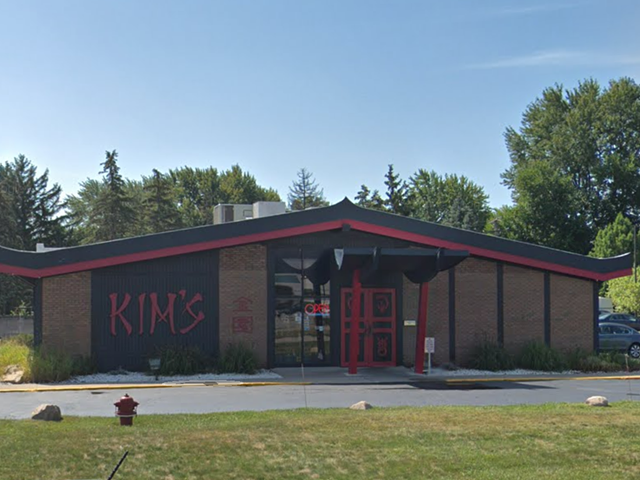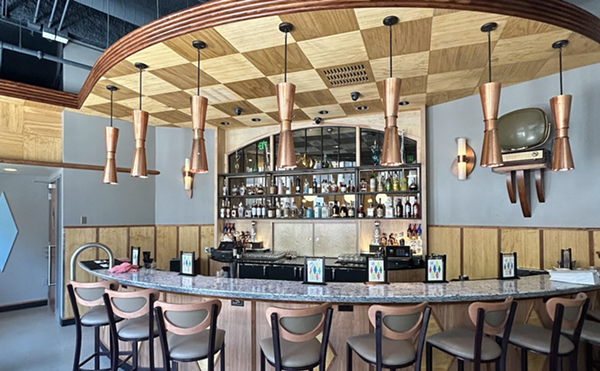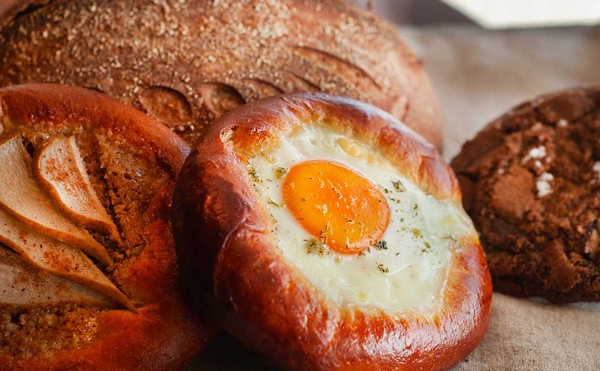Detroit native Kwaku Osei-Bonsu was only a freshman at Howard University when he started his business, Strange Roots — a monthly subscription service that delivered items from Black-owned businesses to college students. The service achieved moderate success before Osei-Bonsu ended it, but the experience helped lead him to his passion: to create and foster Black spaces.
"I want to solidify spaces, to make it so that spaces are safe," the 27-year-old says. "Not in the sense of making it safe for us, but to make it safe from threat — safe from the threat of it not being a Black space."
Since his Howard days, Osei-Bonsu has put together several events in Detroit, including Black Restaurant Week, an annual weeklong showcase of Detroit's Black-owned restaurants. The event returns for its third year on Monday.
Osei-Bonsu says he founded Black Restaurant Week with the mission of making sure Detroit's Black-owned restaurants would not get forgotten as the city's dining scene heated up.
"Being from the area, leaving and coming back, you start to see what your people could have and what they deserve," Osei-Bonsu says.
Initially, Black Restaurant Week started with online branding as a simple way to unite Detroit's Black-owned restaurants under one banner. "It was a platform that didn't need a lot of legwork to get it done," he says. "It was more online-focused, so I just made it happen, and I caught the bug so I thought, 'What else could be Black as hell?'"
Osei-Bonsu knew that an event like Black Restaurant Week would likely come under scrutiny because of its name. "In the past, we've had controversy because of the name. People thought it was exclusively for Black people," he says, defending his vision. "We're only trying to highlight the Black owners and Black chefs."
"If every other city can have a restaurant week, then we can have a Black restaurant week," he adds. "We're a [79-percent] Black city — all of these Black restaurants, they deserve shine."
The struggle Osei-Bonsu is facing is not unique. Other attempts to highlight and celebrate Black spaces have become a hot issue lately, and other culture creators have received backlash in response to their efforts. Earlier this year, creators of AfroFuture Fest came under fire for their decision to charge different ticket prices for "POC" (people of color), charging "non-POC" more with the goal of promoting equity in their community. (After the story went viral, the festival organizers changed the ticket structure to a flat rate, asking white guests to consider paying an additional suggested donation.)
"Detroit is a place where if you want fun, you have to make it yourself," Osei-Bonsu says. "I support anyone that's sticking their necks out to create a space in general. At some point there were people who felt nothing was happening in Detroit, so they left. So with people like Leah Hill, who's throwing Kindred Fest, and the people throwing AfroFuture Fest, I put all my support behind them."
Regarding the backlash, Osei-Bonsu believes all press is good press. "Anything ever worthwhile never came easy," he says. "Disruption is not supposed to make people comfortable."
Participating restaurants this year include metro Detroit favorites like the Block, Flood's, DUO's Restaurant and Lounge, and Jamaican Pot, among others. "The first year we had around 11 restaurants participate, and 16 the second year," Osei-Bonsu says. "This year I just want to have those numbers continue to rise. We've had a slew of Black-owned restaurants open in the last year, so I don't expect that we'll have anything less than 20 to 25 this year."
Chef Antoinette Alexander-Perry of DUO's Restaurant and Lounge says she considers it an honor being one of the restaurants chosen to participate, with the restaurant joining for its second year as part of Black Restaurant Week.
"We enjoy making sure the customer has great food to eat because we understand that whatever energy we hold will be in the food we present," she says. "We all have positive energy when preparing the food. I love that about everyone who works in this kitchen. Positive energy is important to have, especially in such an important event like this."
Even with a larger number of participating restaurants this year, Osei-Bonsu says not every restaurant is accepted into this showcase. He says the selection process has become far more strenuous over the years, and some newer restaurants have even turned down the offer because they felt like it was too soon for the spotlight.
Osei-Bonsu says that his goal for this event is to have an impact well beyond Black Restaurant Week. "I want to bring these restaurants revenue outside of the realm of this one week," he says.
While Black Restaurant Week is primarily focused on fostering a Black space, Osei-Bonsu says the focus for the event is to have more representation within different food communities.
"Our vegan and vegetarian community needs more attention," Osei-Bonsu says. "Our chefs that don't have brick-and-mortars need more attention as well. I need to make sure I'm representing people within the food space in general, not just those who can afford to get a building."
Participants planning to attend this year's Black Restaurant Week can look forward to additional food-related events and other activities, including a cannabis-infused dinner. The full list of events are available at blackmetroeats.com, where tickets can also be purchased.
This year's Black Restaurant Week will also feature its first sponsor: Uncle Nearest, the first Black-owned whiskey company. Osei-Bonsu considers it to be a major milestone for the event. "We didn't take on sponsorship before because we were too afraid they would try to distort the vision and skew it to what their marketing interests were at the time," he says. The company is named after the slave who taught Jack Daniel how to make whiskey.
Participating restaurants like DUO plan to incorporate sponsored products into their meals. Alexander-Perry says guests should look forward to a few surprises. "I've created a special barbecue sauce from Uncle Nearest products," she says. Along with the barbecue sauce, Alexander-Perry wants to create a specialized dessert for Black Restaurant Week. "Hopefully we'll be able to create a dessert with Uncle Nearest too," she says. "I want to do a banana pudding with caramelized bananas on top."
With Black Restaurant Week around the corner, Osei-Bonsu hopes the restaurants on display can be an inspiration to others.
"My message is that, if you want it, you're going to believe in what it is you want to do; then you'll get to the point where you're going to have to jump," he says. "It's a matter of how do I make these dreams happen and how do I also do what I need to do."
"I want every entrepreneur to know that your dream is big enough," he says.
More information, including a full list of participating restaurants, can be found at blackmetroeats.com. Black Restaurant Week runs from Monday, Aug. 19 to Sunday, Aug. 25.
Corrected Friday, Aug. 16: The story has been updated with the latest participating restaurants, as well as the latest Census figures for Detroit's Black population.
Stay on top of Detroit news and views. Sign up for our weekly issue newsletter delivered each Wednesday.





